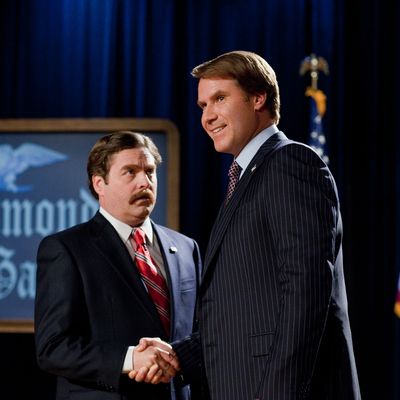
I was delirious at the prospect of The Campaign, a satirical election comedy starring Will Ferrell and directed by Jay Roach. Ferrell’s portrait of George W. Bush in Your Welcome, America was so blessedly silly that the anger of it snuck up on you: This wasn’t just a doofus rich boy but a doofus rich boy whose sense of entitlement and lack of self-awareness made him criminally — tragically — incompetent. Roach’s HBO film of Game Change made it clear that he understood, unlike most American satirists, the minutiae of glad-handing politics.
But the task the filmmakers faced might just have been too difficult: How can any political comedy compete with this year’s Republican primaries? How can Will Ferrell’s stumblebum Jesus-and-country Republican measure up (or down) to addled used-car salesman Rick Perry, with his dismissal of evolution as “a theory that’s out there” followed by mush-mouthed memory glitches. How can Zach Galifianakis’s mincing midget rival the dancing of gay-deprogrammer (or gay deprogrammer?) Marcus Bachmann? What screenwriter would have dared to concoct the preening ignoramus Herman (Uz-becki-becki-beckistan) Cain — and then make him a front-runner? Mark Stamaty’s Bob Forehead is a profound political philosopher next to Mitt Romney, an unexpectedly rich source of cerebral slapstick. The frothy comedy stylings of Rick Santorum, the insult comic Newt Gingrich … Funny, funny stuff. This would be a tall mountain to climb for even an inspired comedy.
The invention in The Campaign began and ended with the premise. When Ferrell’s Cam Brady proves too embarrassing and morally corrupt for even North Carolina Republicans to pull the lever for, the billionaire Motch brothers (John Lithgow and Dan Aykroyd) — ever bent on bankrolling regulation busters — settle on creating a groundswell for Marty Huggins (Galifianakis), the son of a party apparatchik (Brian Cox). The rest of the movie centers on how stupid and unethical the candidates can be, which is very-very. But writers Chris Henchy and Shawn Harwell haven’t brought their A game, and Roach is too stiff a director to give Ferrell room to romp. Bits like the one in which he’s challenged to recite “The Lord’s Prayer” needed extra zigs and zags instead of variations on the same joke. A looser director like Adam McKay (Step Brothers) might have created a happier climate for improv. As it is, the biggest laughs in The Campaign come from the crudest material, from seeing how far the writers are willing to go. (Far.)
There are good lines. I liked when in his first speech Marty told the audience of his father’s admonition “never to say anything bad about the Jews,” and his father’s characterization of him as looking like “Richard Simmons crapped out a hobbit” — although it’s Cox’s brusque, no-frills delivery that sells it. The scene in which Marty attempts to “trash talk” Cam before a debate is a funny idea, and Dylan McDermott cuts a sleek, amusingly humorless figure as Marty’s Motch-funded consultant. But the ads in which Cam’s people (led by Jason Sudeikis) use Marty’s facial hair to connect him to the Taliban could have used some input from actual media consultants, whose work can be far more outlandish. And there’s no excuse for the soft climax, another of those scenes in which a politician throws away a prepared text and tells the audience the truth. (Has that ever happened in real life? Anywhere?)
To my knowledge, this is the first depiction of the Koch brothers onscreen since their role as right-wing overlords became general knowledge. Comedy legends Lithgow and Aykroyd, good as they are, can’t begin to do them justice. Being recognizably human, they’re not scary enough. I’m afraid fiction — perhaps art itself — must throw in the towel when it comes to modern American politics. But I suppose The Campaign has therapeutic value. Unlike its nonfictional counterpart, you can laugh at the absurdity without having the simultaneous urge to get under the covers and weep.


